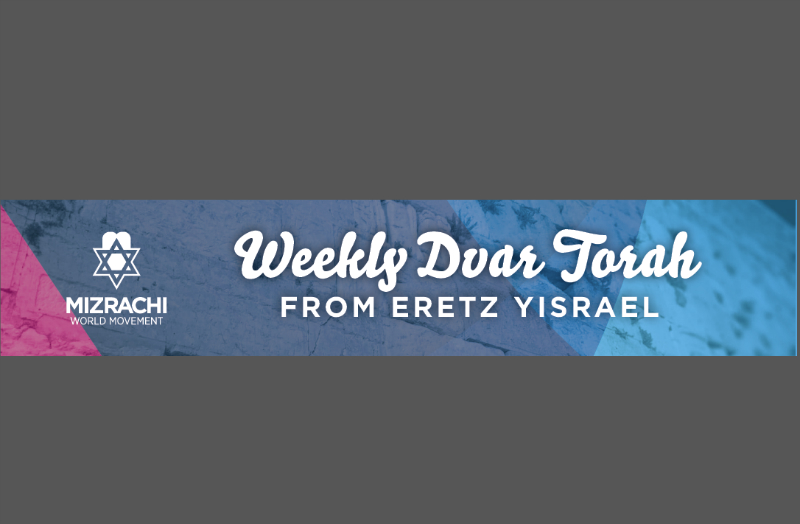There is a famine. Food is scarce, the sheep have nowhere to graze, what does one do?
Yitzchak decides to follow his father’s footsteps, do his basic hishtadlut (exertion, action) and move to a different country. At this point, G-d tells him unequivocally to stay in Eretz Yisrael and promises him that he, and his descendants, will inhabit and flourish in the Land.
Why was he not permitted to leave Eretz Yisrael? Indeed, when Ya’akov was about to leave the Land due to famine, G-d promises him that He will go down with him, and bring him up. Yitzchak is unique that he was commanded to live his entire life in the Land.
The classic answer offered by Rashi is that from the moment he was tied on the altar, Yitzchak became sanctified to Above, and needed to live his whole life in a place permeated with kedushah (holiness). Rabbi Ben-Zion Firrer expounds on this idea: The model of the Akeidah represents Yitzchak’s messirut nefesh (self-sacrifice) to do the will of G-d. He willingly, with humility and joy, was ready to give his life for G-d. In commanding him to stay in the Land, G-d wanted him to now be moser nefesh for the mitzvah of Yishuv Ha’aretz. Yitzchak models for us the ability to give of ourselves completely for G-d’s mitzvot. Rav Firrer adds that since Yitzchak did this chessed of not deserting the Land, the Land repays him, with tremendous bounty. The Chumash tells us that he planted that year and he reaped ‘meah shearim’.
Rav Soloveitchik in his classic essay ‘Kol Dodi Dofek’ poignantly describes how the Land of Israel had waited thousands of years until her children came back to give forth her bounty. Rashi, on the verse “And I will bring the Land into desolation,” (Vayikra 26:32) explains that this is good tidings, that the enemies will not find any goodness in the Land. Throughout the millennia, all the nations that tried to settle Eretz Yisrael were unable to cultivate it. The Land did not betray the people of Israel but waited until we would return to once again be fruitful. The Rav critiqued Orthodox Jewry at that time for not hearing the ‘knock of the beloved’ to come back to the ‘faithful wife’ who had waited so long for this moment of reunion. Yitzchak models for us this faithfulness to the Land, and how we will also reap the benefits.
The Tur compares the three Avot, to the three pilgrimages; Avraham is connected with Pesach, Yitzchak with Shavuot, and Ya’akov with Sukkot. Rabbi Leib Mintzberg, in Ben Melech, explains that Avraham is promised to be a large nation, and on Pesach, we became a nation. Yitzchak reaped a great harvest, which connects with Shavout, and Ya’akov is promised protection from G-d, which is the theme of Sukkot. Clearly, we need to understand the connection between Shavuot and the productivity of the Land.
There are two chagim that celebrate the harvest of the Land — Shavuot celebrates the beginning of the harvest at that time we bring the first fruit; Sukkot is the time of the final harvest when we bring the water libation. Ben Melech draws an important distinction between the two chagim.
Shavuot celebrates Eretz Yisrael — it is time to thank G-d with the first fruit offering of the beauty and bounty of the Land. It is at this time when we see the wheat fields in their abundance, that we are overflowing with gratitude to G-d for this special Land that He has given us. This corresponds to the second brachah in Birkat Hamazon, to thank G-d for the ‘eretz chemdah tova u’rchava’ that is our inheritance.
Sukkot, by contrast, is the holiday that focuses on the special hashgacha (protection) that G-d shows to His people. The produce is already in the silos; we recognize that it is only through G-d’s protection that we will be able to maintain these blessings. This corresponds to the third brachah of Birkat Hamazon, wherein we speak about how G-d is our Shepherd — the One who cares for us.
Yitzchak is the quintessential model of the Av who is connected with the Land and is the only one which the Torah mentions that planted in the land. Hence, Shavuot, which celebrates the gift of Eretz Yisrael, is the chag of Yitzchak.
Parashat Toldot should inspire us to reconnect to the specialness of Eretz Yisrael and to be ready, like Yitzchak to be moser nefesh for the Land, and for Torat Eretz Yisrael.
